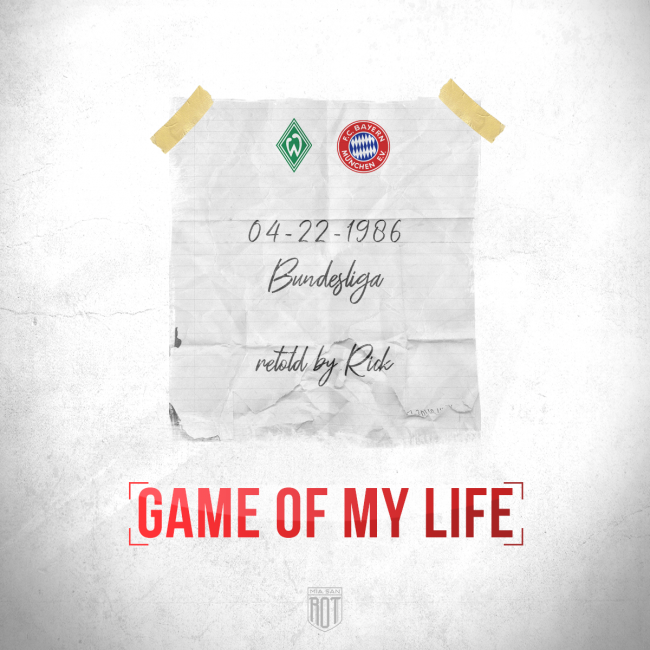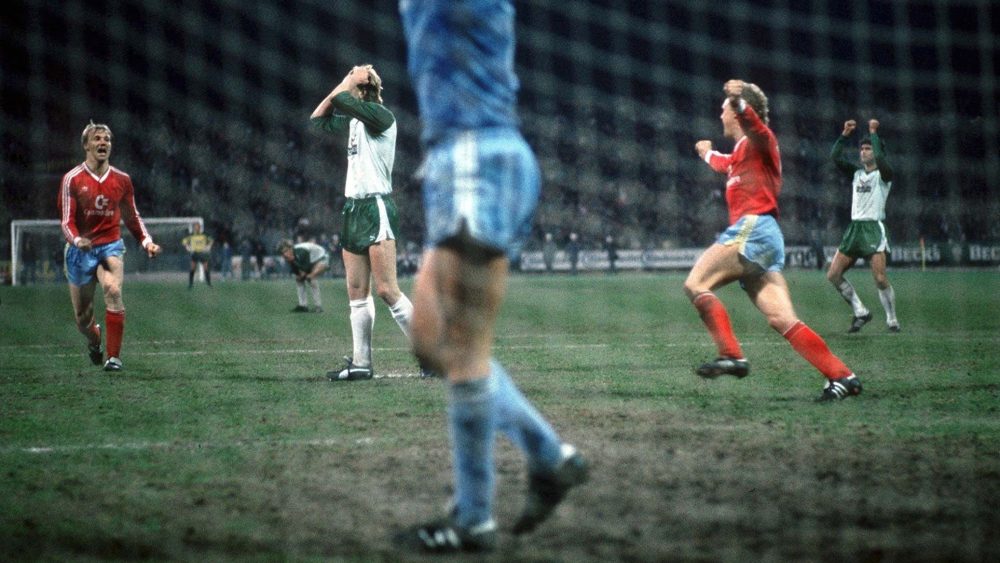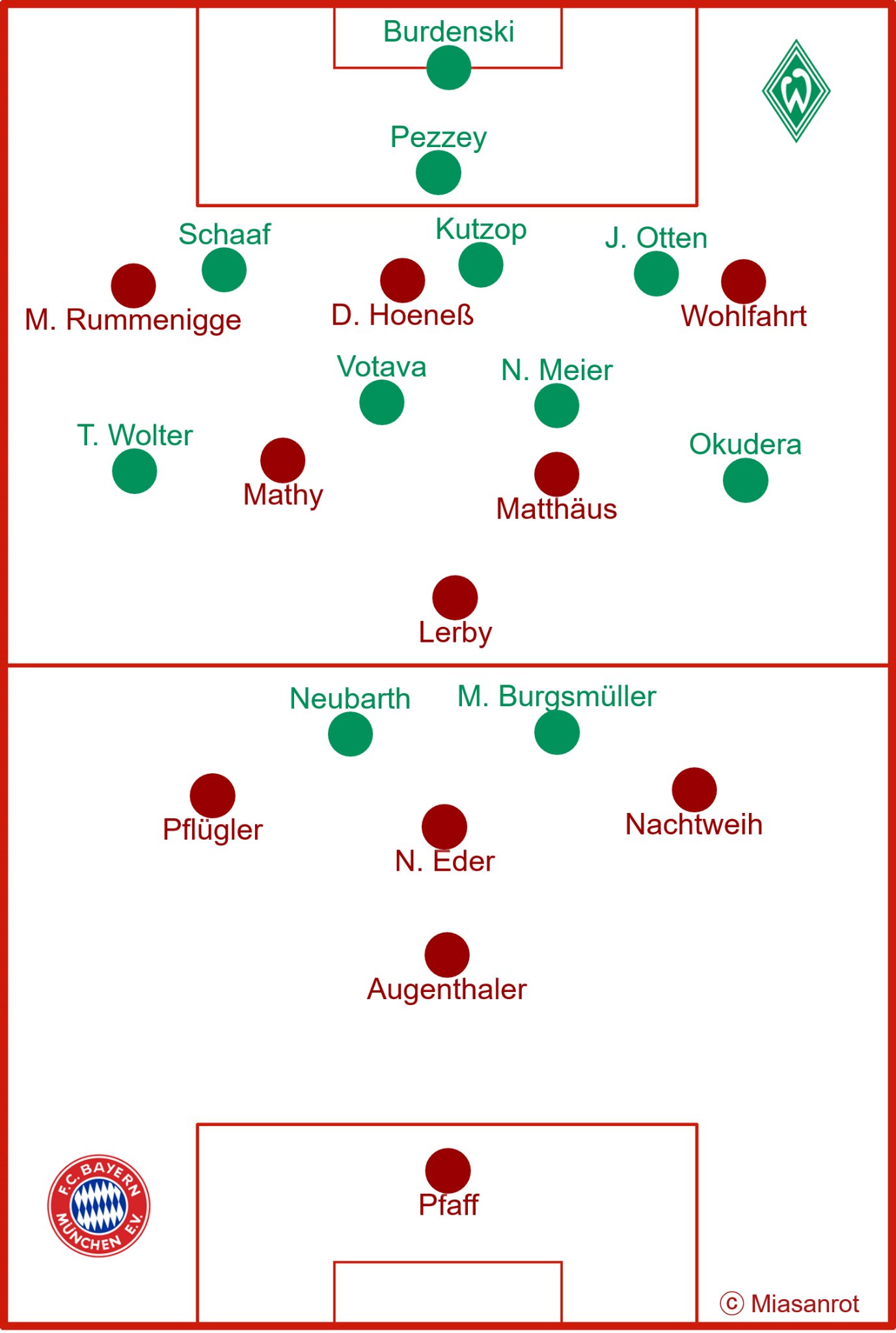Game Of My Life #02: Saved by the post
Topsy-turvy season
On the penultimate match day, 22nd April 1986, fate would bring the two teams together in what would be a moment of drama that would remain lodged in my memory forever. German football was rarely seen on British television in the 1980s, and my being stuck in a boarding school in the countryside did not help; all I had was a long wave radio with a very sketchy reception.
For the vast majority of expert pundits, Bayern’s topsy-turvy season was all set to come to a conclusion at the packed Weserstadion. Bremen had only dropped three points at home all season, while the Bavarians had been far from consistent on the road. In the days of two points for a win, a victory would seal the deal – and a first Bundesliga title – for Otto Rehhagel’s men.
It was the ultimate make or break encounter, and the fixtures could not have been arranged any better. A win for Bayern would have pushed Udo Lattek’s side in front on goal difference, while a draw was just about enough to keep the contest open until the final week.
A cagey, scratchy affair
The match could not have been more dramatic – though at the time I wouldn’t have known to what extent. As usual, the radio coverage was awful. In between loud bursts of noise, I was able to pick up the odd bit of commentary. I desperately played with the controls, trying to find the German voices in the hissing fuzz. The match ticked by, and I remained unsure as to what had actually happened. I had to wait until later in the evening to check the result on teletext – in the days before the internet, this is all we had until the newspapers arrived in the school library the following day.
When I filled in my scrapbook and carefully scribbled in the match details, it would simply read as Werder Bremen 0, Bayern München 0 – enough to keep Bayern in with a shout going into the final week. What I didn’t know at the time was that Werder had been awarded a penalty a minute from the end.

By the time I actually got to see any footage of the game, the season was long over. Any antipathy towards Bremen striker Rudi Völler had long been replaced by the desire to see “Tante Käthe” become a World Cup winner with West Germany in Mexico.
The game itself had been a cagey, scratchy affair, which only burst into life at the end. Looking to break the deadlock, Rehhagel had thrown on Völler for midfielder Norbert Meier in the 77th minute.
Völler’s arrival was a highly significant moment, both in the context of the match and the fast-developing and somewhat bitter rivalry between the two title contenders. It was his first competitive match since November the previous year – when the two teams met in Munich’s Olympiastadion. In what had been another highly-charged encounter, the Bremen striker was clattered by Bayern skipper Klaus Augenthaler in the 28th minute, consigning him to the sidelines for five months.
(The game in Munich was also highly memorable. Augenthaler may have been lucky to escape with the booking for his challenge on Völler, but Bayern were reduced to ten men with the score locked at 1:1 when Lothar Matthäus was dismissed. Bremen would have fancied their chances, but two goals in as many minutes in the second half from Dieter Hoeneß saw the Bavarians clinch a hard-fought 3:1 win).
Tried and tested marksman
The tousle-haired striker was far from fully fit, but it was a desperate throw of the dice from the Bremen coach who desperately wanted to avoid a final week showdown. Just over ten minutes later, the bold switch looked to have paid off.
With the clock ticking towards the end of the regulation ninety minutes, Völler made a trademark dart towards the Bayern penalty area, chasing down the ball with a tiring Søren Lerby. Stumbling slightly as he tried to keep up with the striker, the Dane felt the ball hit his face as Völler attempted to hook it towards the goal – only to see referee Volker Roth pointing to the penalty spot for handball.
Today, the story would have taken a completely different course. The referee would have consulted his team of video assistants, and the decision would have been immediately overturned. Replays from all available angles showed that the ball had been nowhere near Lerby’s hands, but the protests from the Bayern players were waved away by the official.
With just one awful refereeing decision, Bremen were one kick away from clinching the title. Up stepped Polish-born centre-back Michael Kutzop, as reliable a penalty-taker as one could find in the Bundesliga.
Like his contemporary countryman Robert Lewandowski, Kutzop was a tried and tested marksman from the Elfmeterpunkt. If anything, he was even better. Having taken forty penalties and never missed, you could have bet your house and life savings on the blond number four to find a way past Bayern’s Belgian custodian Jean-Marie Pfaff.
A small crowd of journalists and cameramen had gathered behind the Bayern goal and even the local police were on standby at the edge of the terraces as Kutzop stepped up to address the ball, having one last exchange of words with Michael Rummenigge before his one-on-one with Pfaff. It was almost the perfect penalty: taking his run-up from the edge of the box, Kutzop stroked his kick firmly to his right and Pfaff’s left.
Completely helpless and almost rooted to the spot, the Bayern ‘keeper could only watch as the ball flew past him – and struck the outside of the upright before spinning away behind for a goal kick.
Bremen had been, quite literally, a couple of inches of aluminium away from the Bundesliga. Kutzop had taken more than forty penalty kicks in a Bundesliga career that had spanned eleven years for both Werder and Kickers Offenbach; he had never missed before, and until he finally retired in 1990, he would never miss again.
Bayern snatch the title
Having maintained their two-point lead going into the final day, Bremen remained marginal favourites to claim their first title. With Bayern facing fourth-placed Borussia Mönchengladbach at the Olympiastadion, the Green-Whites were at fifth-placed VfB Stuttgart, a team that they had hammered 6:0 earlier in the season. While Bayern needed nothing less than a win over Gladbach and a Bremen defeat just to be in with a chance of snatching the title, Rehhagel’s men just needed a draw.
By half-time, things were already going Bayern’s way. A goal in the opening minute from Lothar Matthäus and a twenty-fifth minute strike from Dieter Hoeneß had given the Bavarians a comfortable advantage at the Olympiastadion, while some two-hundred kilometres to the west at the Neckarstadion in Stuttgart a goal from Karl Allgöwer on twenty-two minutes had put the home side in front. As things stood at that time, Bayern were on top of the table on goal difference.
Things only got better. Roared on by a capacity crowd of seventy thousand, the second half in Munich saw Bayern score four more goals without reply to wrap up a convincing six-goal win, while Allgöwer scored a second for Stuttgart. Manfred Burgsmüller pulled one back for Bremen eleven minutes from the end to heighten the drama and make for a nail-biting final ten minutes, but Rehhagel’s side were unable to score the vital second goal to snatch the title – or rather snatch it back.
Werder Bremen had floundered when it really mattered, and Bayern – like a racehorse advancing on the inside rail in the final straight – had timed their run to perfection to take the race by a short nose on the line. After being second best for the entire season the Bavarians had snatched the Meisterschale right at the death from right under Bremen’s nose, adding even more needle to the burgeoning rivalry between the two sides.
What it meant
When you look at the results, a goalless draw in Bremen doesn’t naturally stand out as a match to remember. Indeed, the game itself was large unmemorable. But it is all about those pivotal moments, and the final drama at the end. The controversial decision, the drama, and that unforgettable moment when the ball skimmed the post and kept Bayern’s title dreams alive.
When I first became a fan of FC Bayern, their biggest rival was Hamburger SV. But as the decade developed and my connection to the Bavarian club grew, Hamburg had been replaced by their northern rivals. While there were many similarities between HSV and Bayern – both big clubs with long and established traditions – Bremen were comparative upstarts.
Coached by the unorthodox and somewhat awkward Otto Rehhagel, Bremen were loved by those who would today be described as “football hipsters”. They were perennial underdogs, a bunch of underrated scrappers, a club defined by their bellicose manager Willi Lemke who was the chalk to Uli Hoeneß’ cheese.
Over the years I had acquired a passionate loathing of the “fish heads”, which was crystallised in the aftermath of the 1985/86 season. While many Bayern fans will look at 2000/01 when thinking of their most memorable title win, for me nothing could ever top Bremen’s title ambitions being dented fifteen years earlier.
Forget HSV, Dortmund, or current pretenders RB Leipzig. Even though Werder Bremen may be struggling right now, nothing gives me that frisson of excitement than a result against the Green-Whites. It is hard to explain while retaining any sense of rationality, but then that is what being a football fan is all about.










